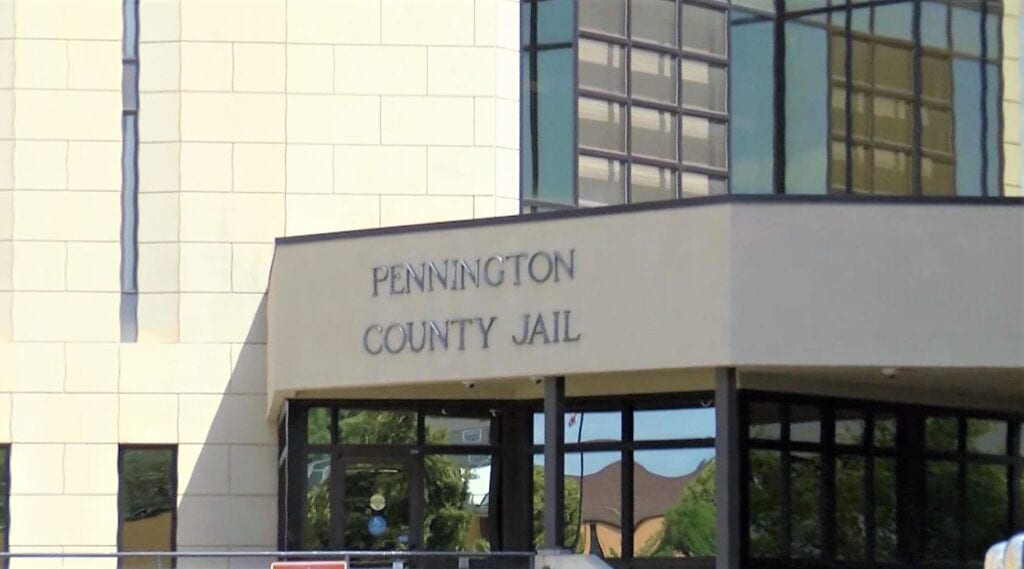OST member nearly dies in custody

Carley Plenty Arrows: “I Don’t know if it’s because I’m Native American, but they showed me that they simply didn’t care about my well-being.”
RAPID CITY — A member of the Oglala Sioux Tribe nearly died while in custody at the Pennington County Jail due to medical neglect by healthcare staff at the facility here.
Carley Plenty Arrows was arrested and taken into custody Feb. 24 on a warrant for a failure to appear in court to face a charge of driving under the influence (DUI) in Pennington County. Plenty Arrows noticed on Feb. 26 that she began feeling severely ill and reported her symptoms to jail medical staff.
“When I reported my symptoms to medical staff, I expressed that something was wrong with me,” said Carley Plenty Arrows to the Native Sun News Today. “I know my body, but all they did was take my temperature, treated me for a bladder infection with antibiotics and sent me back to my cell.”
Her temperature on Feb. 26 registered at 102 degrees, and it kept rising throughout a weekend, leading her to fainting and falling in her cell on March 1, she said in an interview from the hospital.
“On Monday, my eyesight was blurry, and I know I fell down in my cell,” said Plenty Arrows. “I don’t know how long I was there, but when I was able to get up, I called the jail staff and asked them to take my temperature.”
That morning, her temperature rose to 107 degrees, she said. High-grade fevers above 104 degrees can cause brain damage and lead to death. She was transported to the Monument Health Rapid City Hospital where she was told that if she had been transported any later, she could have died due to septic shock.
Septic shock is the most common cause of death in intensive care units in the United States and can lead to organ dysfunction and death. Sepsis is the result of an infection and can be potentially life-threatening. According to the Centers for Disease Control and Prevention (CDC), sepsis occurs when chemicals that fight infection by triggering inflammatory reactions are released into the bloodstream.
Plenty Arrows had court the next day, on March 2. She was granted a release on personal recognizance (PR) bond but had to stay in the intensive care unit (ICU) for six days and five nights before being transferred to a regular hospital floor where she continues to be monitored at Monument Health before she is discharged.
If a detention center fails to provide medical care and that leads to health complications, the government, negligent staff, and private health care providers servicing prisons can be liable. Prisoners and detainees of all kinds have a right to adequate medical care and don’t lose that right when in jail.
Medical negligence is often underreported in America’s jails and prisons for lots of reasons—privacy, funding, and policy preventing law enforcement agencies from communicating with the public. That situation applies to Plenty Arrows’ case.
“Due to HIPAA and ethical laws and protocols governing inmate privacy, the Pennington County Jail does not comment on medical information concerning specific inmates — currently housed or released,” Pennington County Jail Commander Rob Yantis told the Native Sun News Today.
HIPAA is the Health Insurance Portability and Accountability Act of 1996, a federal law that required the creation of national standards to protect sensitive patient health information from being disclosed without the patient’s consent or knowledge.
“The Pennington County Jail employs physicians and nursing staff to care for the medical and mental health needs of inmates in accordance with established state and national medical guidelines,” Yantis said.
According to the Bureau of Justice Statistics, American Indians are incarcerated at a rate that is 38 percent higher than the national average. According to a study published by the Lakota People’s Law Project, American Indian men are admitted to prison at four times the rate of white men, and American Indian women are admitted at six times the rate of white women. According to a report published by United States Probation Officer Brenda Donelan, the estimate for admission to local jails in South Dakota is nearly four times the national average.
“Lakota People’s Law Project continues to support Lakota and Indigenous people in Rapid City, South Dakota,” said Lead Counsel for the Lakota People’s Law Project Chase Iron Eyes to Native Sun News Today. “We have investigated, documented and organized around the treatment of our relatives while incarcerated for more than a decade,” he added.
‘That experience was torture,” said Plenty Arrows. “I don’t know if it’s because I’m Native American, but they showed me they simply didn’t care about my well-being.”
Unlike the prison system, which hold people convicted of serious crimes, jails are locally run and detain people awaiting trial, or those serving short sentences usually one year or less. The toll of jail inmates who die without a case resolution points to a tremendous flaw in the U.S. criminal justice system.
The U.S. Constitution grants inmates core rights, but those provisions aren’t always enforced. The Fourteenth Amendment guarantees fair treatment to pre-trial detainees, but “fair” is open to interpretation by judges and juries.
The U.S. Supreme Court has ruled that the Eighth Amendment’s ban on cruel punishment forbids “deliberate indifference to serious medical needs of prisoners,” but proving deliberate negligence is difficult. The Sixth Amendment assures speedy trials but does not define speedy.
Detailed insight into jail deaths can save lives.
“Pennington County must support Indigenous self-determination on stolen land in order for us to help ourselves,” said Iron Eyes. “Until then, we’ll continue to demand equitable treatment for our relatives who have the misfortune of coming into contact with law enforcement in the Rapid City area.”
(Contact Darren Thompson at darrenjthompson@hotmail.com)
The post OST member nearly dies in custody first appeared on Native Sun News Today.
